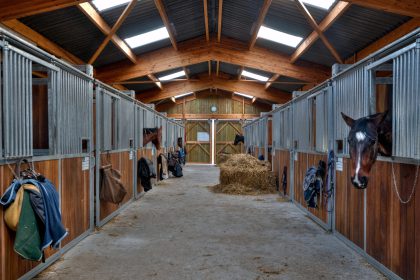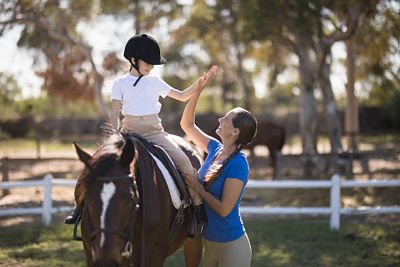What is involved in gaining riding instructor qualications?
2024
To become a qualified riding coach or riding instructor – these are the same qualification. There are two main routes for general riding coaches in the UK – via the Association of British Riding Schools or the British Horse Society.
One of our associates teaching clients
The ABRS route comes under the British Equestrian Federation as the awarding body and training route with the Certificate in Equestrian Coaching. This is run by First 4 Sport who oversee all the different sports in the UK. This is therefore the national coaching body for all sports in UK.
This certificate is also offered via the various BEF membership bodies with the various disciplines such as British Showjumping, British Eventing, Dressage etc. Carriage Driving, Vaulting, etc. etc..
The BHS route on the other hand offers the BHS coach certificate. The BHS set up their own awarding company called Equestrian Qualfications Ltd – EQL
In the UK as in most countries who have set up Equestrian governing bodies, to work in a hands on capacity with horses and with horses and riders, there is not real shortcut. You cannot simply gain the teaching element alone – that is not possible. Nor can you gain any of the professional qualifications for working in a hands on capacity by distance learning. The qualification for coach/instructor is a practically based qualification and can ony be gained after prior professional and required qualifications are achieved.
Anyone aiming to gain a professional coaching qualification in any sport must first have shown by practical assessment, that they have the practical skills and ability to train and handle horses safely and awareness of the welfare of horse and rider and those around them.
Simply stating to an awarding body by word of mouth or even stating in writing, that you are experienced or have years of experience and knowledge, is insufficient to enable you to enter a qualification process. This applies to most professions and trades for which a professional qualification is required. These professional qualifications are the basis on which any insurer will supply an instructor with cover so it is vital to maintain those professional qualifications.
It is also vital that any rider or person working with an instructor or coach with their horse, ensures that the instructor is in fact insured and therefore qualified to the required standard. We are all aware that being involved with horses is a risk. Should any accident occur it is safer to know that there is probable support available via insurance.
The general riding public should be aware that they would be ill advised to use a coach for – let’s say deep sea diving or mountain climbing, (both of which are also risk sports) who was not qualified or insured. The same applies to being around horses.
Qualifications in most professions require assessement of the candidate being awarded the qualification otherwise the certification is meaningless. Doctors, nurses, lawyers, engineers, plumbers, tree surgeons etc. etc. are all required to show by assessment and usually also by practical ability, that they are able to undertake the work involved safely and according to the required principles, standards and practices before being awarded professional certification.
For equestrian coaches there are specific equine management qualifications which include horse training qualifications which must be gained prior to being able to put yourself forwards for coaching qualifications with the awarding bodies.
During the early assessments and these several and varied pre requisite qualifications leading up to the final assessment for basic coach qualifications, candidates are questioned in detail on the theory surrounding the various and assorted topics of equine welfare and care and management – from basics to advanced physiology. Finally they are required to demonstrate in front of assessors their planning, teaching and coaching skills whilst taking into consideration the various safety aspects, different learning styles, mental approaches and risk assesments associated with the coaching they are undertaking.
Riding instructors and coaches must also have gained the required first aid qualifications, the relevant safeguarding certificates and ride safe award amongst other certificates.
It is not possible therefore, to achieve a professional coaching qualification in the equestrian world by distance learning.
The theory on which you would be questioned during any assessments – whether that is for the pre requisite qualifications or the coaching qualification, can however be gained by distance learning with Lingfield Equine Distance Learning courses.
For example the Lingfield Level 1 Plus could well be the place to start that journey. Alternatively a subsidised option for career students is the Intermediate Diploma programme.
Whichever Lingfield course you choose however, you can be sure that we are here to help and support you and will point you in the right direction for the practical training where possible. We have assisted many who longed to work with horses to achieve their goal. Taking a course could mean it is your personal road to success.
One of our ex students is now a Stage 4 BHS coach working with us as author/tutor, others are working as grooms or equine holiday centre manager, another runs a riding school, one handles our database, another is our volunteeer social media moderator. Another is running her own yard and as a result of being so involed, her husband is now training to be a farrier. All these people now have work or careers as a result of taking a Lingfield course.


Receive latest news and industry insights straight to your inbox.